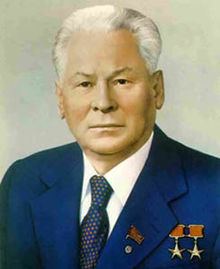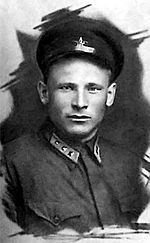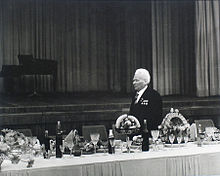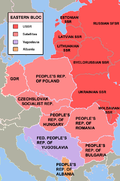- Konstantin Chernenko
-
Konstantin Chernenko
Константин Черненко
General Secretary of the Communist Party of the Soviet Union In office
13 February 1984 – 10 March 1985Preceded by Yuri Andropov Succeeded by Mikhail Gorbachev Chairman of the Presidium of the Supreme Soviet of the Soviet Union In office
11 April 1984 – 10 March 1985Preceded by Yuri Andropov
Vasili Kuznetsov (acting)Succeeded by Andrei Gromyko
Vasili Kuznetsov (acting)Second Secretary of the Communist Party of the Soviet Union In office
November 1982 – 13 February 1984General Secretary Yuri Andropov Preceded by Yuri Andropov Succeeded by Mikhail Gorbachev
Grigory RomanovPersonal details Born 24 September 1911
Bolshaya Tes, Yeniseysk Governorate, Russian EmpireDied 10 March 1985 (aged 73)
Moscow, Russian SFSR, Soviet UnionNationality Soviet Political party Communist Party of the Soviet Union Spouse(s) Anna Dmitrevna Lyubimova Children Albert Chernenko Religion None (atheist) Signature 
Konstantin Ustinovich Chernenko[1] (24 September 1911 – 10 March 1985) was a Soviet politician and the fifth General Secretary of the Communist Party of the Soviet Union. He led the Soviet Union from 13 February 1984 until his death thirteen months later, on 10 March 1985. Chernenko was also Chairman of the Presidium of the Supreme Soviet from 11 April 1984 until his death.
Contents
Early life
Chernenko was born to a poor family in the village of Bolshaya Tes (now in Novosyolovsky District, Krasnoyarsk Krai). His father, Ustin Demidovich (of Ukrainian origin),[citation needed] worked in copper and gold mines while his mother took care of the farm work.
Chernenko joined the Komsomol (Communist Youth League) in 1929, and became a full member of the Communist Party in 1931. From 1930 to 1933, he served in the Soviet frontier guards on the Soviet-Chinese border. After completing his military service, he returned to Krasnoyarsk as a propagandist. In 1933 he worked in the Propaganda Department of the Novosyolovsky District Party Committee. A few years later he was promoted head of the same department in Uyarsk Raykom. Chernenko then steadily rose through the Party ranks, becoming the Director of the Krasnoyarsk House of Party Enlightenment then in 1939, the Deputy Head of the AgitProp Department of Krasnoyarsk Territorial Committee and finally, in 1941 he was appointed Secretary of the Territorial Party Committee for Propaganda. It was in the 1940s that Chernenko established a close-knit relationship with Fyodor Kulakov.[2] In 1945, he acquired a diploma from a party training school in Moscow, and in 1953 he finished a correspondence course for schoolteachers.
The turning point in Chernenko’s career was his assignment in 1948 to head the Communist Party’s propaganda department in the Moldavian Soviet Socialist Republic. There, he met and won the confidence of Leonid Brezhnev, the first secretary of Moldova from 1950 to 1952 and future leader of the Soviet Union. Chernenko followed Brezhnev in 1956 to fill a similar propaganda post in the CPSU Central Committee in Moscow. In 1960, after Brezhnev was named chairman of the Presidium of the Supreme Soviet (titular head of state of the Soviet Union), Chernenko became his chief of staff.
Politburo career
In 1964 Soviet leader Nikita Khrushchev was deposed, and succeeded by Leonid Brezhnev. During Brezhnev's tenure as Party leader, Chernenko's career continued successfully. He was nominated in 1965 as head of the General Department of the Central Committee, and given the mandate to set the Politburo agenda, and prepare drafts of numerous Central Committee decrees and resolutions. He also monitored telephone and wiretapping devices in various offices of the top Party members. Another one of his jobs was to sign hundreds of Party documents daily, a job he did for the next 20 years. Even after he became General Secretary of the Party, he continued to sign papers referring to the General Department (when he could no longer physically sign documents, a facsimile was used instead).
In 1971 Chernenko was promoted to full membership in the Central Committee: Overseeing Party work over the Letter Bureau, dealing with correspondence. In 1976 he was elected secretary of the Letter Bureau. 1977 he became Candidate, 1978 full member of the Politburo, serving second to the General Secretary in terms of Party hierarchy.
During Brezhnev's final years, Chernenko became fully immersed in ideological Party work: Heading Soviet delegations abroad, accompanying Brezhnev to important meetings and conferences, and was a member of the commission that revised the Soviet Constitution in 1977. In 1979 he took part in the Vienna arms limitation talks.
After Brezhnev's death in November 1982, there was speculation the position of General Secretary would fall to Chernenko, however he was unable to rally enough popular support for his candidacy within the Party, and the posting fell to former KGB chief Yuri Andropov.
Leader of the Soviet Union
Yuri Andropov died in February 1984, after just 15 months in office. Chernenko was then elected to replace Andropov, despite concerns over his own ailing health, and against Andropov's wishes (he stated he wanted Gorbachev to succeed him). Yegor Ligachev writes in his memoirs that Chernenko was elected general secretary without a hitch. At the Central Committee plenary session on 13 February 1984, four days after Andropov's death, the Chairman of the Council of Ministers, literally Premier, and Politburo member Nikolai Tikhonov moved that Chernenko be elected general secretary, and the Committee duly voted him in.
Arkady Volsky, an aide to Andropov and other general secretaries, recounts an episode that occurred after a Politburo meeting on the day following Andropov's demise: As Politburo members filed out of the conference hall, either Andrei Gromyko or (in later accounts) Dmitriy Ustinov is said to have put his arm round Nikolai Tikhonov's shoulders and said: "It's okay, Kostya is an agreeable guy (pokladisty muzhik), one can do business with him...." The Politburo failed to pass the decision for Gorbachev, who was nominally Chernenko's second in command, to run the meetings of the Politburo itself in the absence of Chernenko; the latter due to his declining health, began to miss those meetings with increasing frequency. As Nikolai Ryzhkov describes it in his memoirs, "every Thursday morning he (Mikhail Gorbachev) would sit in his office like a little orphan – I would often be present at this sad procedure – nervously awaiting a telephone call from the sick Chernenko: Would he come to the Politburo himself or would he ask Gorbachev to stand in for him this time again?"
At Andropov's funeral, he could barely read the eulogy. Those present strained to catch the meaning of what he was trying to say in his eulogy. He spoke rapidly, swallowed his words, kept coughing and stopped repeatedly to wipe his lips and forehead. He ascended Lenin's Mausoleum by way of a newly installed escalator and descended with the help of two bodyguards.
Chernenko represented a return to the policies of the late Brezhnev era. Nevertheless, he supported a greater role for the labour unions, and reform in education and propaganda. The one major personnel change that Chernenko made was the firing of the chief of the General Staff, Nikolay Ogarkov, who had advocated less spending on consumer goods in favor of greater expenditures on weapons research and development.
In foreign policy, he negotiated a trade pact with the People's Republic of China. Despite calls for renewed détente, Chernenko did little to prevent the escalation of the Cold War with the United States. For example, in 1984, the Soviet Union prevented a visit to West Germany by East German leader Erich Honecker. However, in the late autumn of 1984, the U.S. and the Soviet Union did agree to resume arms control talks in early 1985. In November 1984 Chernenko met with Britain's Labour Party leader, Neil Kinnock.
In 1980, the U.S. had boycotted the Summer Olympics held in Moscow in protest at the Soviet invasion of Afghanistan. The 1984 Summer Olympics were due to be held in Los Angeles. On 8 May 1984, Chernenko's USSR announced its intention not to participate, citing security concerns and "chauvinistic sentiments and an anti-Soviet hysteria being whipped up in the United States",[3]. The boycott was joined by 14 Eastern Bloc countries and allies, including Cuba (but not Romania). The action was widely understood as revenge for the US boycott of the Moscow Games. The boycotting countries organized their own 'Friendship Games' in the summer of 1984.
Death and legacy
In the spring of 1984, Chernenko was hospitalized for over a month, but kept working by sending the Politburo notes and letters. During the summer, his doctors sent him to Kislovodsk for the mineral spas, but on the day of his arrival at the resort Chernenko's health deteriorated, and he contracted pneumonia. Chernenko did not return to the Kremlin until the late autumn of 1984. He awarded Orders to cosmonauts and writers in his office, but was unable to walk through the corridors of his office and was driven in a wheelchair.
By the end of 1984, Chernenko could hardly leave the Central Clinical Hospital, a heavily guarded facility in west Moscow, and the Politburo was affixing a facsimile of his signature to all letters, as Chernenko had done with Andropov's when he was dying. In what was almost universally regarded,[citation needed] even by his opponents, as a cruel act against Chernenko, Politburo member Viktor Grishin dragged the terminally ill Chernenko from his hospital bed to a ballot box to vote in the elections in early 1985.[citation needed]
Emphysema and the associated lung and heart damage worsened significantly for Chernenko in the last three weeks of February 1985. According to the Chief Kremlin physician, Dr. Yevgeny I. Chazov, Chernenko had also developed both chronic hepatitis and cirrhosis.[3] On 10 March at 3:00 pm he fell into a coma, and at 7:20 pm he died as a result of heart failure. He became the third Soviet leader to die in just two years' time, and, upon being informed in the middle of the night of his death, US President Ronald Reagan, who was seven months older than Chernenko and just over three years older than his predecessor Andropov, is reported to have remarked "how am I supposed to get anyplace with the Russians if they keep dying on me?"[4]
He was honored with a state funeral and was buried in the Kremlin necropolis – the last person to be interred there.
The impact of Chernenko—or the lack of it—was evident in the way in which his death was reported in the Soviet press. Soviet newspapers carried stories about Chernenko's death and Gorbachev's selection on the same day. The papers had the same format: page 1 reported the party Central Committee session on 11 March that elected Gorbachev and printed the new leader's biography and a large photograph of him; page 2 announced the demise of Chernenko and printed his obituary.
After the death of a Soviet leader it was customary for his successors to open his safe and look in it. When Gorbachev had Chernenko's safe opened, it was found to contain a small folder of personal papers and several large bundles of money; money was also found in his desk.[5]
Chernenko was awarded the Order of the Red Banner of Labour, 1976, in 1981 and in 1984 he was awarded Hero of the Socialist Labor: on the latter occasion, Minister of Defence Ustinov underlined his rule as an "outstanding political figure, a loyal and unwavering continuer of the cause of the great Lenin"; in 1981 he was awarded with the Bulgarian Order of Georgi Dimitrov and in 1982 he received the Lenin Prize for his "Human Rights in Soviet Society."
His first marriage produced a son, Albert, who would become noted in the Soviet Union as a legal theorist. His second wife, Anna Dmitrevna Lyubimova (b. 1913), who married him in 1944, bore him two daughters, Yelena (who worked at the Institute of Party History) and Vera (who worked at the Soviet Embassy in Washington, DC) in the United States, and a son, Vladimir, who was a Goskino editorialist.
He had a Gosdacha in Troitse-Lykovo named Sosnovka-3 by the Moskva River with a private beach, while Sosnovka-1 was used by Mikhail Suslov.
See also
- Index of Soviet Union-related articles
References
- ^ Russian: Константи́н Усти́нович Черне́нко
- ^ Hough, Jerry F. (1997). Democratization and revolution in the USSR, 1985–1991. Brookings Institution Press. p. 67. ISBN 0815737483. http://books.google.com/books?id=BzaaFXMpvMkC&dq.
- ^ a b "SUCCESSION IN MOSCOW: A PRIVATE LIFE, AND A MEDICAL CASE; AUTOPSY DISCLOSES SEVERAL DISEASES", Altman, Lawrence K., New York Times, 25 March 1985
- ^ Maureen Dowd. Where's the Rest of Him? New York Times, 18 November 1990.
- ^ Dmitri Volkogonov. (1998), The Rise and Fall of the Soviet Empire. Harper Collins Publishers. (page 430). (ISBN 9780006388180]
- Brown, Archie. "The Soviet Succession: From Andropov to Chernenko," World Today, 40, April 1984, 134–41.
- Daniels, Robert V. "The Chernenko Comeback," New Leader, 67, 20 February 1984, 3–5.
- Halstead, John. "Chernenko in Office," International Perspectives, May–June 1984, 19–21.
- Meissner, Boris. "Soviet Policy: From Chernenko to Gorbachev," Aussenpolitik [Bonn], 36, No. 4, April 1985, 357–75.
- Urban, Michael E. "From Chernenko to Gorbachev: A Repolitization of Official Soviet Discourse," Soviet Union/Union Soviétique, 13, No. 2, 1986, 131–61.
- Pribytkov, Victor, "Soviet-U.S. Relations: The Selected Writings and Speeches of Konstantin U. Chernenko", The American Political Science Review, Vol. 79, No. 4 (December 1985), p. 1277
Party political offices Preceded by
Yuri AndropovGeneral Secretary of the Communist Party of the Soviet Union
13 February 1984 – 10 March 1985Succeeded by
Mikhail GorbachevPreceded by
Vladimir Nikiforovich MalinHead of the General Department of the CPSU Central Committee
13 February 1984 – 10 March 1985Succeeded by
Claudius M. BogolyubovGovernment offices Preceded by
Vasili KuznetsovChairman of the Presidium of the Supreme Soviet
1965–1982Succeeded by
Vasili KuznetsovSporting positions Preceded by
 Jean Doré
Jean DoréPresident of Organizing Committee for Summer Olympic Games
1980Succeeded by
 Peter Ueberroth
Peter UeberrothLeaders of the Communist Party of the Soviet Union Heads of state of the Soviet Union Heads of state Vice heads of state Acting heads of state 1940s Yalta Conference · Operation Unthinkable · Potsdam Conference · Gouzenko Affair · War in Vietnam (1945–1946) · Iran crisis of 1946 · Greek Civil War · Corfu Channel Incident · Restatement of Policy on Germany · First Indochina War · Truman Doctrine · Asian Relations Conference · Marshall Plan · Czechoslovak coup d'état of 1948 · Tito–Stalin split · Berlin Blockade · Western betrayal · Iron Curtain · Eastern Bloc · Chinese Civil War (Second round)1950s Korean War · 1953 Iranian coup d'état · Uprising of 1953 in East Germany · 1954 Guatemalan coup d'état · Partition of Vietnam · First Taiwan Strait Crisis · Geneva Summit (1955) · Poznań 1956 protests · Hungarian Revolution of 1956 · Suez Crisis · Sputnik crisis · Second Taiwan Strait Crisis · Cuban Revolution · Kitchen Debate · Asian–African Conference · Bricker Amendment · McCarthyism · Operation Gladio · Hallstein Doctrine1960s Congo Crisis · Sino–Soviet split · 1960 U-2 incident · Bay of Pigs Invasion · Berlin Wall · Cuban Missile Crisis · Vietnam War · 1964 Brazilian coup d'état · United States occupation of the Dominican Republic (1965–1966) · South African Border War · Rhodesian Bush War · Transition to the New Order · Domino theory · ASEAN Declaration · Laotian Civil War · Greek military junta of 1967–1974 · Six-Day War · War of Attrition · Cultural Revolution · Sino-Indian War · Prague Spring · Goulash Communism · Sino–Soviet border conflict1970s Détente · Nuclear Non-Proliferation Treaty · Black September in Jordan · Cambodian Civil War · Realpolitik · Ping Pong Diplomacy · Four Power Agreement on Berlin · 1972 Nixon visit to China · 1973 Chilean coup d'état · Yom Kippur War · Strategic Arms Limitation Talks · Angolan Civil War · Mozambican Civil War · Ogaden War · Sino-Albanian split · Cambodian–Vietnamese War · Sino-Vietnamese War · Iranian Revolution · Operation Condor · Bangladesh Liberation War · Korean Air Lines Flight 9021980s Soviet war in Afghanistan · 1980 and 1984 Summer Olympics boycotts · Solidarity (Soviet reaction) · Contras · Central American crisis · RYAN · Korean Air Lines Flight 007 · Able Archer 83 · Star Wars · Invasion of Grenada · People Power Revolution · Tiananmen Square protests of 1989 · United States invasion of Panama · Fall of the Berlin Wall · Revolutions of 1989 · Glasnost · Perestroika1990s Foreign
policyIdeologies Capitalism (Chicago school · Keynesianism · Monetarism · Neoclassical economics · Supply-side economics · Thatcherism · Reaganomics) · Communism (Marxism–Leninism · Castroism · Eurocommunism · Guevarism · Juche · Left communism · Maoism · Stalinism · Titoism · Trotskyism) · Liberal democracy · Social democracyOrganizations Propaganda Races See also Brinkmanship · NATO–Russia relations · Soviet and Russian espionage in U.S. · Soviet Union – United States relations · US–Soviet summitsNotable figures of the Cold WarSoviet Union Joseph Stalin · Vyacheslav Molotov · Andrei Gromyko · Nikita Khrushchev · Anatoly Dobrynin · Leonid Brezhnev · Alexei Kosygin · Yuri Andropov · Konstantin Chernenko · Mikhail Gorbachev · Nikolai Ryzhkov · Eduard Shevardnadze · Gennady Yanayev · Boris YeltsinUnited States People's Republic of China Japan West Germany United Kingdom Italy France Finland Spain People's Republic of Poland Canada Philippines Africa José Eduardo dos Santos · Jonas Savimbi (Angola) · Patrice Lumumba · Mobutu Sese Seko (Congo/Zaire) · Agostinho Neto · Mengistu Haile Mariam (Ethiopia) · Kwame Nkrumah (Ghana) · Julius Nyerere (Tanzania) · Idi Amin (Uganda) · Muammar Gaddafi (Libya)Eastern Bloc Enver Hoxha (Albania) · Todor Zhivkov (Bulgaria) · Alexander Dubček (Czechoslovakia) · Walter Ulbricht · Erich Honecker (East Germany) · Mátyás Rákosi · Imre Nagy · János Kádár (Hungary) · Nicolae Ceauşescu (Romania) · Josip Broz Tito (Yugoslavia)Latin America Juan Domingo Perón · Jorge Rafael Videla · Leopoldo Galtieri (Argentina) · Getúlio Vargas · Luís Prestes · Leonel Brizola · João Goulart · Castelo Branco (Brazil) · Salvador Allende · Augusto Pinochet (Chile) · Fidel Castro · Che Guevara (Cuba) · Daniel Ortega (Nicaragua) · Rómulo Betancourt (Venezuela)Middle East Mohammad Najibullah · Ahmad Shah Massoud (Afghanistan) · Gamal Abdel Nasser · Anwar Sadat (Egypt) · Mohammad Reza Pahlavi · Mohammad Mosaddegh · Ayatollah Khomeini (Iran) · Saddam Hussein (Iraq) · Menachem Begin (Israel)South and East Asia Sheikh Mujibur Rahman (Bangladesh) · U Nu · Ne Win (Burma) · Pol Pot (Cambodia) · Indira Gandhi · Jawaharlal Nehru (India) · Sukarno · Suharto · Mohammad Hatta · Adam Malik (Indonesia) · Kim Il-sung (North Korea) · Syngman Rhee · Park Chung-hee (South Korea) · Muhammad Ayub Khan · Zulfikar Ali Bhutto · Muhammad Zia-ul-Haq (Pakistan) · Chiang Kai-shek · Chiang Ching-kuo (Taiwan) · Ho Chi Minh (North Vietnam) · Ngo Dinh Diem (South Vietnam)Fall of Communism Internal conditions Brezhnev stagnation · Cultural Revolution · Eastern Bloc · Eastern Bloc economies · Eastern Bloc politics · Eastern Bloc information dissemination · Eastern Bloc emigration and defection · KGB · Nomenklatura · Samizdat · Shortage economy · TotalitarianismInternational relations Active measures · Cold War · List of socialist countries · Predictions of Soviet collapse · Reagan Doctrine · Soviet Empire · Terrorism and the Soviet Union · Vatican oppositionReforms of socialism Events by country Eastern Bloc countries: Albania · Bulgaria · Czechoslovakia · East Germany · Hungary · Poland · Romania · Soviet Union · Yugoslavia
Former Soviet Republics: Armenia · Azerbaijan · Belarus · Estonia · Georgia · Latvia · Lithuania · Kazakhstan · Kirghistan · Moldova · Russia · Tajikstan · Turkmenistan · Ukraine · Uzbekistan
Other countries: Afghanistan · Angola · Benin · Burma · Cambodia · China · People's Republic of the Congo · Ethiopia · Mongolia · Mozambique · Nicaragua · Somalia · South YemenCommunist leaders Ramiz Alia · Heydar Aliyev · Yuri Andropov · Aung San · Siad Barre · Leonid Brezhnev · Fidel Castro · Nicolae Ceauşescu · Konstantin Chernenko · Mikhail Gorbachev · Károly Grósz · Hua Guofeng · Erich Honecker · Enver Hoxha · János Kádár · Nikita Khrushchev · Kim Il-sung · Milouš Jakeš · Wojciech Jaruzelski · Mathieu Kérékou · Mengistu Haile Mariam · Slobodan Milošević · Denis Sassou Nguesso · Saparmurat Niyazov · Daniel Ortega · Kaysone Phomvihane · Pol Pot · Tôn Đức Thắng · Phoumi Vongvichit · Ne Win · Deng Xiaoping · Todor ZhivkovAnti-communist leaders Corazon Aquino · Sali Berisha · Willy Brandt · Vladimir Bukovsky · Violeta Chamorro · Chiang Ching-kuo · Viacheslav Chornovil · Tsakhiagiin Elbegdorj · Václav Havel · John F. Kennedy · Helmut Kohl · Vytautas Landsbergis · Pope John Paul II · Zianon Pazniak · Augusto Pinochet · Ronald Reagan · Lee Teng-hui · Margaret Thatcher · Harry S. Truman · Lech Wałęsa · Boris Yeltsin · Zhelyu ZhelevDemocracy movements Chinese democracy movement · Civic Forum · Democratic Party of Albania · Democratic Russia · Sąjūdis · Rukh · Solidarity · Popular Front of Latvia · Popular Front of Estonia · Public Against Violence · Belarusian Popular Front · National League for Democracy · National Opposition Union · United Nationalist Democratic Organization · National Salvation Front · Union of Democratic ForcesEvents People Power Revolution · Revolutions of 1989 · April 9 tragedy · Black January · Baltic Way · 1988 Polish strikes · Tiananmen Square protests of 1989 · Removal of Hungary's border fence · Polish Round Table Talks · Hungarian Round Table Talks · Pan-European Picnic · Monday demonstrations in East Germany · Fall of the Berlin Wall · Malta Summit · German reunification · January 1991 events in Lithuania · January 1991 events in Latvia · 1991 Soviet coup d'état attempt · Yemeni unification · Chilean transition to democracyPost-collapse Colour revolution · Decommunization · Democratization · Economic liberalization · Economic reforms after the collapse of socialism · Neo-Stalinism · North Korean famine · Oslo Accords · Post-communism · Putinism · Special Period · Yugoslav WarsEastern Bloc Formation Annexed as, or into, SSRs Eastern Finland · Estonia · Latvia · Lithuania · Memel · East Prussia · West Belarus · Western Ukraine · Moldavia · Uzbekistan · Kazachstan · Azerbaijan · Georgia · Tajikstan · Kirgizstan · Turkmenistan · ArmeniaAnnexing SSRs Related organizations Revolts and opposition Welles Declaration · The Goryani Movement · Forest Brothers · Operation Jungle · State continuity of the Baltic states · Baltic Legations (1940–1991) · Cursed soldiers · Uprising in Plzeň (1953) · Uprising of 1953 in East Germany · 1956 Georgian demonstrations · Poznań 1956 protests · Hungarian Revolution of 1956 · Novocherkassk massacre · Prague Spring and Warsaw Pact invasion of Czechoslovakia · 1968 Red Square demonstration · Polish 1970 protests · June 1976 protests · Solidarity, Soviet reaction and Martial law · Reagan Doctrine · Jeltoqsan · April 9 tragedy · Romanian Revolution of 1989 · Black JanuaryConditions Eastern Bloc emigration and defection · Sovietization of the Baltic states · Eastern Bloc information dissemination · Eastern Bloc politics · Eastern Bloc economies · Telephone tapping in the Eastern Bloc · List of Eastern Bloc defectorsDecline Revolutions of 1989 · Fall of the Berlin Wall · Fall of communism in Albania · Singing Revolution · Collapse of the Soviet Union · Dissolution of Czechoslovakia · January 1991 events in Lithuania · January 1991 events in LatviaCategories:- 1911 births
- Russian people of Ukrainian descent
- 1985 deaths
- Central Committee of the Communist Party of the Soviet Union members
- Cold War leaders
- Deaths from cirrhosis
- Heads of the Communist Party of the Soviet Union
- Heads of state of the Soviet Union
- Heroes of Socialist Labour
- People buried in the Kremlin Wall Necropolis
- People of the Soviet war in Afghanistan
- Politburo of the Central Committee of the Communist Party of the Soviet Union members
- Russian atheists
- Soviet propagandists
- Soviet politicians
Wikimedia Foundation. 2010.





